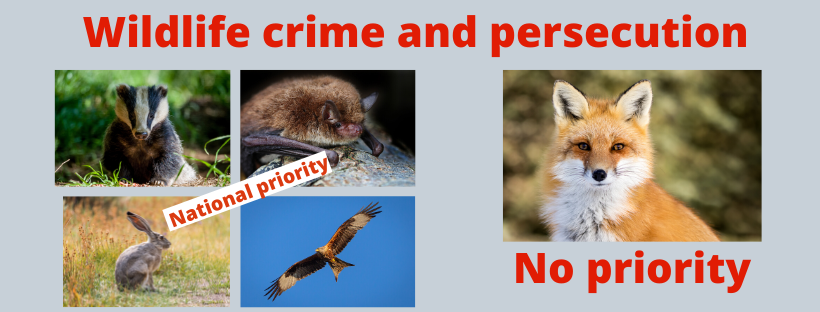Where are our priorities when it comes to wildlife crime and persecution?


Today, (29 November 2019) the National Wildlife Crime Enforcers Conference is taking place in Milton Keynes, hosted by the National Wildlife Crime Unit.
I was shocked to learn that fox hunting is not even on the priority list when it comes to law enforcement and tackling wildlife crime, despite it being an activity with one of the highest levels of criminal activity in the land. Furthermore, fox hunting doesn’t just involve hunting and killing foxes in the most barbaric way imaginable, there are a whole host of other wildlife crimes directly linked to fox hunting. Sett blocking is one of the most obvious, but there are others such as quad bikes being driven illegally on roads, overloaded with terrier men who it is claimed are “mending fences”. I’m not quite sure why every single hunt needs at least four terrier men to mend a fence, or is it that hunts are causing a lot of property damage! I will leave you to draw your own conclusions as to why terrier men are really present at a hunt. Either way, they’re up to no good.
But back to the National Wildlife Crime Unit. This organisation undoubtedly does fantastic work with limited resources, and there are daunting challenges with wildlife crime continuing to be an increasing problem across many different areas from botany and plant protection through to dealing with the moment of animal parts and artefacts under CITES legislation.
What I don’t understand is that we have a serious national problem where groups of people are out each week persecuting and killing wildlife despite there being a law that ought to prevent them from doing this, but nowhere on the NWCU website is this shown as being an issue at all.
Now we all know that the law on hunting with hounds has more holes than the proverbial sieve, but that shouldn’t stop us from trying to enforce it, and making it a priority to reduce the levels of direct and associated criminal activity.
I have challenged the NWCU on this issue this morning, and received the response that it is a local issue and a police matter and not a national issue! I’ve thought about this and it doesn’t make sense. The hunts in my county alone cross police boundaries, which is one of the reasons the NWCU gave me in defining what constitutes local and national. I’m not wholly convinced by this argument, and I don’t want to push the case for reducing the focus on the other species such as hares, raptors, and badgers, but I do think the fox has a place on this list, and it can be argued that the priority might be higher than for some of the other species.
Whatever the reasons for giving no priority whatsoever to fox hunting, whether it’s politically motivated or driven by a lack of resources, there is one very important point to consider. If the NWCU don’t see illegal fox hunting and its associated criminal activities as a priority, then what message does this send to the police who are called upon to enforce the ban?
If fox hunting was moved higher up the priority list with NWCU, would we not start to see better law enforcement, because heaven knows we have enough video and photographic evidence that crimes are indeed being committed week in, week out, but very few prosecutions by comparison?
For me, this issue should be a high priority and I know that there many wildlife crime officers out there who feel exactly the same and are frustrated by the lack of support and awareness on this issue.
Hats off to the NWCU though for their work with all the other species. You still have my support but let’s bring one of other much-loved species into the mix too please. Foxes do not deserve the appalling levels of persecution they currently face, and being torn apart by packs of hounds is no way to die for any creature.